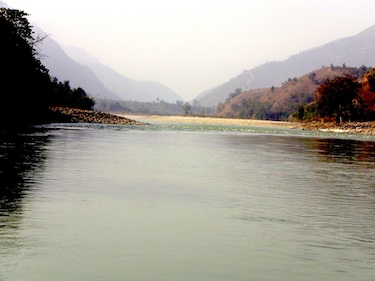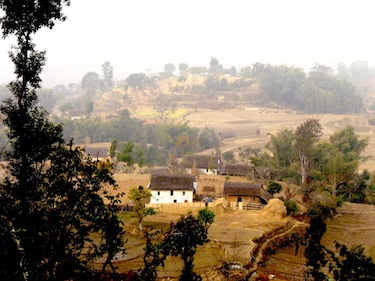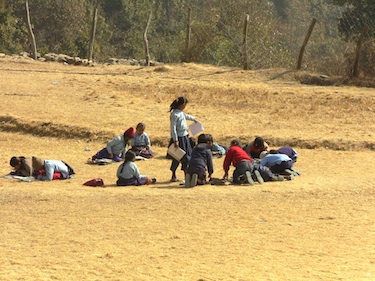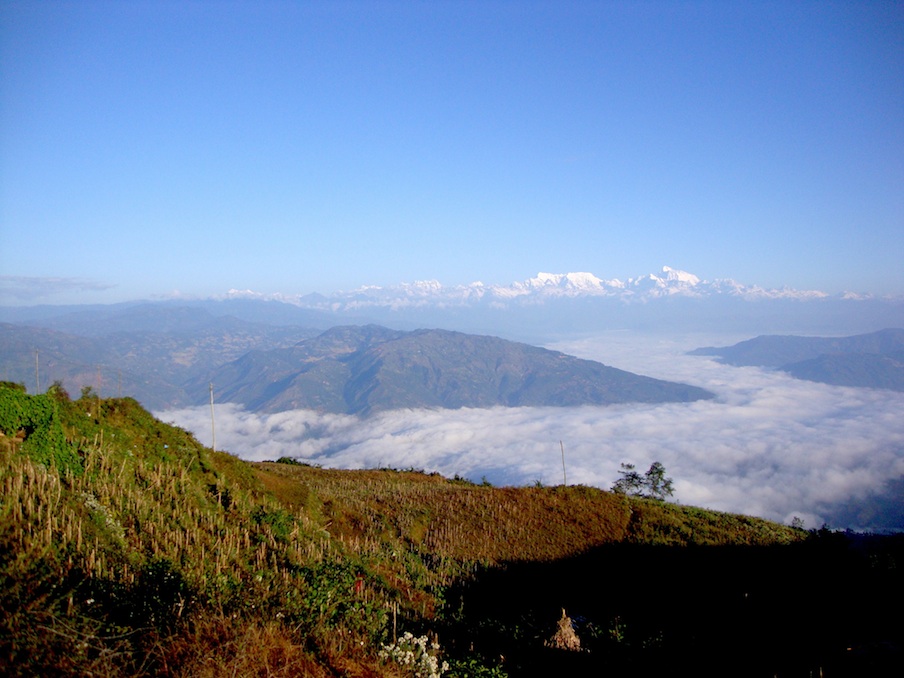Then, after visiting Yaku, while in Kathamandu
I wrote the following blog post:
Click on this link to see a rough 8 minute youtube video from the trip.
Folks,
I'm back out of the hills and in Kathmandu. So, I'll try to summarize how the trip has gone and what I think I've learned and post some pictures.
Bottom line is that far far more changes here in the last 3 years than I imagined possible. So, every Nepali I meet will complain to me about how the government is paralyzed and all the politicians are corrupt and if only they'd get their act together, the "load sharing" of electricity would stop (after all, Nepal has the greatest potential for hydro electric power in the world - so if the government got it together there'd be plenty of electric power, and there are all kinds of other developments that these folks are wanting). Well first, stop right there. Practically every Nepali I talk with identifies what they want their government to do and what the problem is. Then they say the solution is "transparency". Folks, do you realize how sophisticated that concept of "governmental transparency" is? Boggles the mind that I'm discussing governmental transparency with villagers in Yaku. This is sooo far from what I expected, takes my breath away.
But then, I say to them: you're right, but I'm confused. When I was here three years ago there was no electricity in Bhojpur and now there is. Three years ago, there was no road to Bhojpur or Yaku and now there is. And there are road all over the hills now that there weren't here three years ago. And three years ago, there were no cell phones (mobiles) in these hills and now everyone has a cell phone and is talking on cell phones all day long. And didn't the government do those things. And hasn't the government done many other things like provide more medicines at the health center, and the ferry service at Leguwa and the engineer who is assigned to Yaku to design roads and other public works, isn't he paid by the government. Isn't this all new in the last 3 years? They each smile, and agree, yes, this is all true, and no, they can't explain it.
I'm here to tell you that the politicians in Kathmandu may be as corrupt and incompetent as the people think, but someone is running the government in Nepal very well. I was shocked that to ride the ferry across the Arun River, which didn't exist 3 years ago, there is no charge. As a Nepali explained to me, since the government provides roads for free, and the ferry is part of the road system, it's free too. Now, there's a quaint notion.
And then, 3 years ago, virtually no one would try to speak English with me. Now, many students want to practice English. They all read English and understand written English much better than I do Nepali, but pronunciation was not taught. Now there are "English Medium" schools all over Nepal - even in the hills. My high school, and the other government supported high schools are not
"English Medium". So, many parents send their children - even at 6 and 7 years of age to private English Medium boarding schools. Boggles the mind. Even teachers at the Yaku High School have their young children at such schools in distant places like Itiari and Kathmandu.
So, I took 2 ipods, 2 ipads, one laptop with itunes installed to manage the Apple products and a wonderful video projector that hooks up to the ipxds and computer: and a couple dozen videos and several dozen books and many wonderful, playful and educational "apps" on the ipxds. I was ready for the folks at the school to be very thankful and gracious and uninterested. Nothing of the sort. Mesmerized and fascinated are the words that come to mind. The teachers and the students are so eager and motivated. They had read about people going to the moon. They were enraptured watching the video. The planet earth videos with the animals and the fantastic video of different places - they wanted to watch continually.
And I was prepared for them to stand aside and wait for me to set everything up and make it all work and be hesitant to touch these new things. (I do have Mohan, my Nepali friend, who is a computer wizard, way beyond what I can do, to help encourage and train them.) But, again, many of the teachers wanted to get their hand on the iPxds and three stepped up to learn and teach how the projector works. I credit the arrival of cell phones for much of their acceptance and excitement. They talk on these cell phones all day long. Even poor people in the hills have one, or two. And it was shocking to see them taking pictures and sending the photos to each other's cell phones with Bluetooth technology that I've not learned. I tell you, it's not simple.
One highlight for me was working with a young lady teacher, (now that right there is a new thing: women teachers are stepping up and taking charge.) who is desperate to learn the internet. They have a very sporadic cell phone connection to the internet that frustrates me so much that I give up. Not Shiva. Every day she'd set up one of the computers that Mohan had gotten for the school a couple years ago, and try to log onto the internet. After about 5 days, finally, we got an adequate signal. I was able to help her get her own gmail account, and then we did Google searches. We pulled up Nepali news papers, - about 4 of them. The teachers were delighted. This was especially telling since the teachers had been excited that morning since the latest newspapers had arrived, - two weeks old.
For me, the goal of all this is a good internet connection. Then the educational possibilities expand 1000 fold. It's coming. Cell technology is spreading and improving so fast here. There are now several providers with several services, not just the government phone service, Nepal Telecom. I'm working with Mohan to get all internet services that are available to be practically available for the school. A multinational cell phone provider, Ncell has said it will provide 3G service to all of Nepal. You wonder how that could be possible until you look up at the ridges I used to wander in the old days gazing on the lovely cottages of the quaint medieval society, and see solar powered cell towers in the most unlikely places.
So, folks, Yaku, is no longer a medieval society. It now is a mixture of vestiges of that way of life - people still plowing fields with oxen and wooden plows not that much different from what you'd have found in Mesopotamia 3000 years ago; - and the industrial revolution, - with the diesel power mill that husk rice and millet and presses oil; - and America in 1900 - when electricity arrived; - and Whidbey Island in the 1920s when people quit farming and moved to the city. There are very few young people in Yaku who expect to farm. They are getting education and if they are successful academically they go study and work in America, or Australia or Europe; and if they aren't academically successful, then they go work as laborers and food servers in the cities: Kathmandu, New Delhi, Saudi Arabia, Abu Dhabi, Malaysia, Singapore. In some ways Yaku is much more in the 22st century than we on Whidbey Island are. They are hungry for news of the new global society that is emerging. They are raising their children to live in that society. They are so eager and enthusiastic for the future. It's not so quaint and charming, but peoples' lives are much much better. Sanitation was non existent before. What a silly notion that there are little animals crawling around on your skin that you can't see that cause illness. Who would believe that? Oh, they believe it now. Water supplies are protected. There are antibiotic medicines administered by trained, competent health workers in Yaku's medical center. And, for young people, the question we grew up with: "What do you want to be when you grow up" is as real in Nepal as for our children. Choices and opportunities. I spent an evening with a member of the Yaku diaspora in Kathmandu who is a practicing poet. Teaches Nepali language in the college, but his passion is writing and publishing poetry. Oh, and he teaches Nepali and Sanskrit to Japanees students and travels to Japan occasionally. Oh, we have become a global village.
What I hope for Yaku is that with the coming of the internet the young people don't have to leave the village to get a good education. And they won't have to leave the village to get a good job that is part of the Global society. And they won't have to leave their village to participate in the art and politics and culture of the Global Village. It could happen.
And if it doesn't, helping the children in Yaku experience computers they will need to know how to use when they leave the village seems helpful.

Homes in Jimmy Gown - a couple miles north west of
Shree Vishwa Premi High School in Yaku

In winter, or as Nepali's call it, the cold months, school classes are held outdoors in the sunshine where it is warm. The teacher is not present. One of the excellent cultural norms of Nepal is that students are responsible for learning. Teachers help. Teachers do not motivate or entertain.

Looking Northwest from the ridge near Pakharibas across the Arun River Valley toward the ridge where Shree Vishwa Premi High School is on the left slope just below the top of the hill on the other side of the clouds. On the horizon are mountains blocking the view of Mt Everest. Makalu, 27,825 ft, 5th highest, is prominent on the right.
